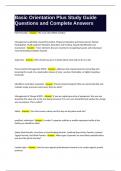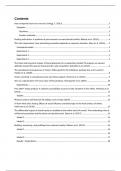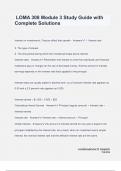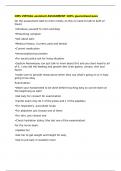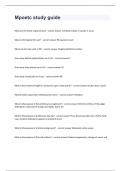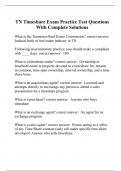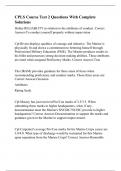Genetics and evolution
For every human trait or behaviour:
1) How do we do it? → mechanisms = proximate explanations (same level of
what you’re studying)
2) Why do we do it? → historical evolutionary perspective = distal
explanations (looking back in time)
Darwin: how did all the life forms come about?
During his time, it was believed that God created all the species = divine creation. Modern
versions are creationism and intelligent design. The alternative, radical idea was
that species were created by evolution by natural selection; Darwin (and
Wallace) brought this idea forward in 1858. Darwin provided loads of evidence →
species come into existence naturally.
Evolution
Artificial selection, human controlled selective breeding. Species change over time by natural
selection. Traits that are favourable in an environment will become more prevalent, because
they’re more likely to survive and reproduce.
Conditions for natural selection:
1) Variation in traits between individuals: if the environment changes, there is
something to select because of differences → favourable ones will survive
2) Favourable traits are hereditary (inborn) - able to pass on
3) Not every individual is able to produce (as much) offspring: otherwise, an equal
number of traits would be passed on. There is a reproductive advantage for some.
4) There is overproduction of offspring, because not everyone survives.
Biological fitness → survival of the fittest = most successful in passing on traits. Individuals
who don’t reproduce are a failure.
Darwin changed the way people viewed life; people aren’t special
Functionalism, the attempt to explain behaviour in terms of what it accomplishes for the
behaving individual.
Evidence for evolution: fossils, anatomical evidence (the inside of mammals looks similar),
bio-geographical evidence (different species on islands that were far away) and molecular
evidence (mutations in genes). But also, artificial evidence, such as having domestic
animals. The evolution theory has never been refuted, it’s difficult to find evidence against it
(you should find a body part of any creature of 1 billion years old).
Remarks of evolution:
- Evolution has no purpose (It’s based on random variations)
- All species are equally well adapted to their environment (otherwise species will go
extinct)
- Natural selection isn’t good/bad or moral/immoral. Nature doesn’t know these terms,
things just happen.
Human evolution
First human-like creatures: 4,4 million years ago
For every human trait or behaviour:
1) How do we do it? → mechanisms = proximate explanations (same level of
what you’re studying)
2) Why do we do it? → historical evolutionary perspective = distal
explanations (looking back in time)
Darwin: how did all the life forms come about?
During his time, it was believed that God created all the species = divine creation. Modern
versions are creationism and intelligent design. The alternative, radical idea was
that species were created by evolution by natural selection; Darwin (and
Wallace) brought this idea forward in 1858. Darwin provided loads of evidence →
species come into existence naturally.
Evolution
Artificial selection, human controlled selective breeding. Species change over time by natural
selection. Traits that are favourable in an environment will become more prevalent, because
they’re more likely to survive and reproduce.
Conditions for natural selection:
1) Variation in traits between individuals: if the environment changes, there is
something to select because of differences → favourable ones will survive
2) Favourable traits are hereditary (inborn) - able to pass on
3) Not every individual is able to produce (as much) offspring: otherwise, an equal
number of traits would be passed on. There is a reproductive advantage for some.
4) There is overproduction of offspring, because not everyone survives.
Biological fitness → survival of the fittest = most successful in passing on traits. Individuals
who don’t reproduce are a failure.
Darwin changed the way people viewed life; people aren’t special
Functionalism, the attempt to explain behaviour in terms of what it accomplishes for the
behaving individual.
Evidence for evolution: fossils, anatomical evidence (the inside of mammals looks similar),
bio-geographical evidence (different species on islands that were far away) and molecular
evidence (mutations in genes). But also, artificial evidence, such as having domestic
animals. The evolution theory has never been refuted, it’s difficult to find evidence against it
(you should find a body part of any creature of 1 billion years old).
Remarks of evolution:
- Evolution has no purpose (It’s based on random variations)
- All species are equally well adapted to their environment (otherwise species will go
extinct)
- Natural selection isn’t good/bad or moral/immoral. Nature doesn’t know these terms,
things just happen.
Human evolution
First human-like creatures: 4,4 million years ago



